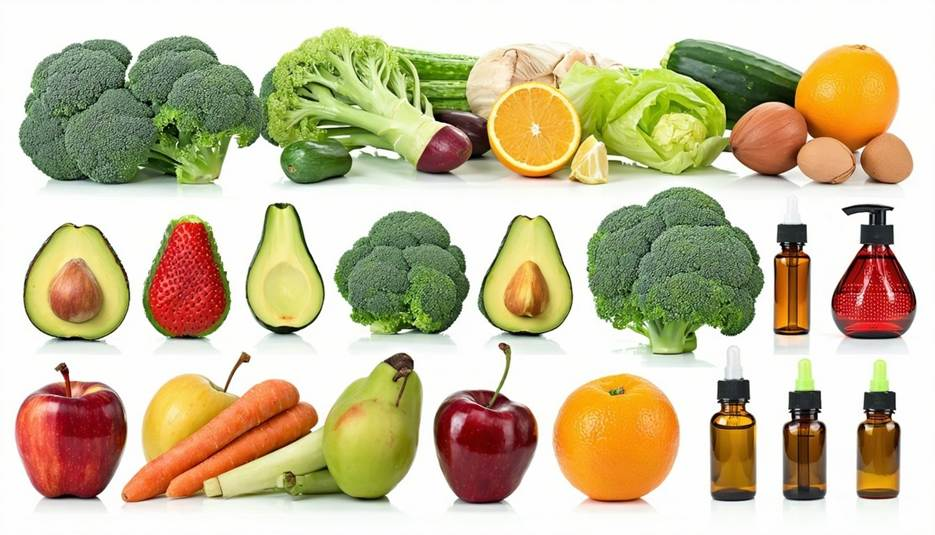Most people don’t realize just how crucial vitamins are to their health. Unlike macronutrients such as dietary fats, carbohydrates, and proteins, wellness vitamins and supplements such as vitamin D supplement, vitamin A supplement and other dietary supplements regulate metabolic reactions. In other words, you can consume just the right amounts of fats, carbohydrates, and proteins and even exercise like a maniac, but unless your body also has a good supply of wellness vitamins and supplements to regulate the use of these macronutrients, very little benefit will be gained from them. In fact, the absence of just a single vitamin can block one or more metabolic reactions, eventually disrupting your entire metabolic balance at a cellular level.
Here is a quick overview of the incredible health benefits provided by specific vitamins and also know the rich source of all these vitamins in one best health supplement drink.
Vitamin A: Sometimes referred to as beta-carotene, vitamin A is a fat-soluble vitamin that serves several major functions in your body. It helps cells reproduce normally, is required for normal fetal growth and development, and is needed for normal reproductive function. Vitamin A is also required for vision as it maintains healthy cells in various structures of the eye and is essential for the transfer of light into nerve signals in the retina. It helps regulate your immune system, plays a major role in bone growth, and helps maintain the surface linings of the respiratory, urinary, and intestinal tracts. When these linings break down, bacteria and viruses can enter the body and cause infection. The earliest sign of vitamin A deficiency is poor night vision, but other symptoms can include dry skin, increased risk of infections, and metaplasia, which is a dangerous pre-cancerous condition.
Vitamin B-1: Also known as thiamine, vitamin B-1 is necessary for practically every cellular reaction in the body. It is vital for normal functioning of the nervous system, heart, muscles, and metabolism. Vitamin B1 works with other B vitamins to release the energy from food you consume and also helps maintain the health of your mucus membranes. Additionally, it supports normal growth and development and reduces depression, fatigue, and even motion sickness. Symptoms of vitamin B-1 deficiency include fatigue, depression, decreased mental functioning, muscle cramps, nausea, heart enlargement, and eventually beriberi.
Vitamin B-2: Otherwise known as riboflavin, vitamin B-2 is essential to energy generation, nerve development, blood-cell development, and the regulation of certain hormones. It also plays an important role in normal growth and development as well as keeping your brain and nervous system healthy. Together with vitamins A and B-1, vitamin B-2 supports the health of your mucus membranes, skin, and even your hair. Symptoms of a vitamin B-2 deficiency can include red, swollen, or cracked mouth and tongue tissue; fatigue; depression; and anemia. The formation of cataracts may be a result of this vitamin deficiency.
Vitamin B-3: Also known as cholecalciferol, vitamin B-3 acts like other B vitamins to create enzymes that are essential to metabolic cell activity. It synthesizes hormones, repairs genetic material, and maintains normal functioning of the nervous system. Vitamin B-3 is also known to decrease harmful cholesterol and triglyceride levels as it helps keep your blood vessels dilated to ensure healthy blood flow. This fabulous vitamin is essential for the repair of genetic material: helps ward off heart attacks, depression and migraine headaches; and can even help improve digestion and increase the absorption of calcium. Vitamin B-3 deficiency can produce symptoms such as dermatitis on the hands and face, weakness, loss of appetite, sore mouth, diarrhea, anxiety, depression, osteoporosis, and even dementia.
Vitamin B-5: Also called pantothenic acid, vitamin B-5 is a co-enzyme involved in energy metabolism of carbohydrates, protein, and fat. Like vitamin B-2, vitamin B-5 is crucial to normal growth and development. It also helps relieve stress, reduces fatigue, and even helps promote wound healing. Symptoms of vitamin B-5 deficiency include excessive fatigue, sleep disturbances, loss of appetite, nausea, or dermatitis.
Vitamin B-6: Pyridoxine, also knows as vitamin B-6, helps carry out metabolic processes that affect your body’s utilization of protein, carbohydrates, and fat. It is also vital to the maintenance of a healthy nervous system and produces the mood-regulating hormone serotonin. Vitamin B-6 promotes cardiovascular health and helps reduce painful inflammation associated with arthritis, carpal tunnel syndrome and other musculoskeletal conditions, and has even been linked to the reduction of PMS and asthma symptoms. It is key in the formation of hemoglobin in red blood cells and antibodies that help fight infection and anemia. Symptoms of vitamin B-6 deficiency include weakness, mental confusion, irritability, nervousness, inability to sleep, hyperactivity, anemia, skin lesions, tongue discoloration, and kidney stones.
Vitamin B-9: More commonly known as folic acid, vitamin B-9 is crucial for proper cell replication and growth. Folic acid forms building blocks of DNA, the body’s genetic information and building blocks of RNA, which are needed for protein synthesis in all cells. Rapidly growing tissues such as those of a fetus and rapidly regenerating cells like red blood cells and immune cells have a high need for folic acid. Vitamin B-9 reduces the risk of spina bifida during pregnancy and works with vitamin B-12 to help keep the circulation healthy. Another exciting discovery about folic acid is that it may help fight against several types of cancer and cardiovascular disease. Symptoms of folic acid deficiency include anemia, mood disorders, and gastrointestinal disorders. Neural tube defects may occur when a vitamin B-9 deficiency occurs during pregnancy.
Vitamin B-12: Also known as cyanocobalamin, vitamin B-12 is needed for normal nerve cell activity, DNA replication, and production of the mood-affecting hormone SAMe (S-adenosyl-L-methionine). Vitamin B-12 acts with folic acid and vitamin B-6 to reduce the risk of heart disease, stroke, osteoporosis, and Alzheimer’s disease. And, of course, vitamin B-12 is famous for its ability to quickly increase energy and memory. Symptoms of a vitamin B-12 deficiency include nausea, loss of appetite, sore mouth, diarrhea, loss of sensation in hands and feet, confusion, memory loss, and depression. Harmful anemia can also be a result of this deficiency.
Vitamin C: One of the most crucial vitamins in your body, vitamin C plays a large role in hundreds of the body’s functions. This powerful antioxidant helps to protect against free radicals; fights infection; boosts iron absorption; and helps maintain healthy skin, blood vessels bones, and gums. It is also essential for the manufacture of collagen, which is vital for tissue repair. Vitamin C even helps heal wounds, burns, and broken tissues. It contributes to hemoglobin and production of red blood cells in bone marrow and is effective against urinary tract infections and anemia. Even more exciting is the fact that vitamin C promotes production of interferon, a compound that is known to fight cancer. Symptoms of vitamin C deficiency include prolonged healing of wounds, frequent infections, prolonged colds, muscle weakness, loss of teeth, bleeding gums, swollen or painful joints, nosebleeds, bruising, anemia and depression.
Vitamin D: Sometimes called the sunshine vitamin, vitamin D is needed for normal body growth and development. In particular, vitamin D helps your body absorb calcium and phosphorus to create bone. Vitamin D plays a role in maintaining a healthy immune system and blood cell formation and also helps cells “differentiate” -- a process that may reduce the risk of cancer. It is needed to produce and maintain adequate blood levels of insulin. Deficiency symptoms include bone pain and tenderness and muscle weakness. Without proper daily intake of vitamin D, there is an increased risk of osteoporosis, arthritis, and cancer.
Vitamin E: Also known as alpha tocopherol, vitamin E is an antioxidant that protects cell membranes and other fat-soluble parts of the body, such as LDL cholesterol (the “bad” cholesterol), from damage. Only when LDL is damaged does cholesterol appear to lead to heart disease, and vitamin E is an important antioxidant protector of LDL. In addition to its antioxidant functions, vitamin E is known to have a positive effect on inflammation, blood cell regulation, connective tissue growth, and genetic control of cell division. It also plays a role in the body’s ability to process glucose. Symptoms of vitamin E deficiency include lethargy, loss of balance, and anemia. There may even be an increased risk of heart disease, cancer, and premature aging with marginal deficiencies of this vitamin.
Vitamin H: Also referred to as biotin, vitamin H is a water-soluble B vitamin that assists in the metabolism of protein, fats, and carbohydrates. It is also important in the transfer of carbon dioxide. Biotin even helps maintain a steady blood sugar level. Symptoms of a vitamin H deficiency, although rare, may include hair loss, dermatitis, anemia, muscle pain, loss of appetite, lethargy, depression, hallucinations, and lowered immunity.
No one wants or needs to miss out on all these essential wellness vitamins and supplements in their daily health routine. Trévo is a nutritional product rich in all natural supplements so you don’t have to think about any vitamin deficiency in your body. With Trévo wellness liquid supplement, getting your daily dose of all of your essential vitamins as well as minerals, antioxidants, and more has never been easier. Trévo liquid wellness supplement has over 174 ingredients for “WHOLE BODY HEALTH”. Enjoy vibrant health in one delicious and convenient formula just by taking one to two ounces per day.




